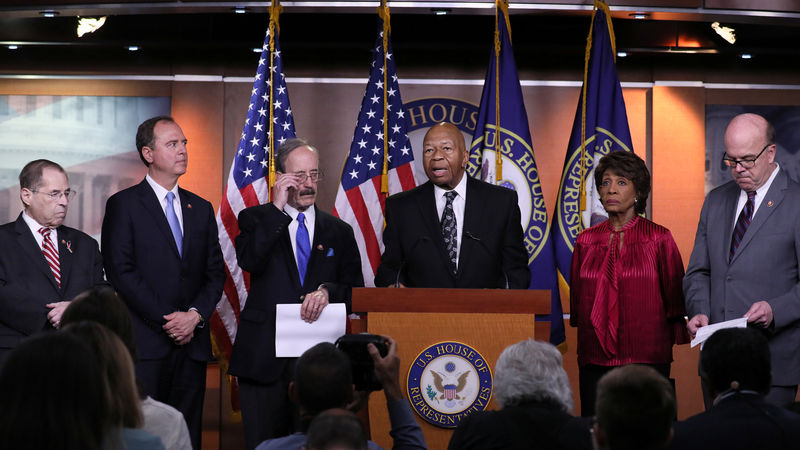By Jan Wolfe
WASHINGTON (Reuters) - Like numerous U.S. presidents before him, Donald Trump has invoked the legal doctrine known as executive privilege to try to block congressional investigators from getting access to certain documents and witnesses they are seeking.
Trump has cited executive privilege twice so far as part of his effort to stonewall Congress on its multiple inquiries into his presidency, finances and businesses. The Republican president has called the Democratic-led investigations "presidential harassment." In an unusual move, he is even suing to try to stop the release of some material lawmakers have sought.
Trump turned to executive privilege for a second time on Wednesday to keep under wraps documents on adding a citizenship question to the 2020 U.S. census, defying a Democratic-led House of Representatives committee's subpoena.
Trump first invoked it in May to block House Democrats from getting an unredacted copy of Special Counsel Robert Mueller's report on Russian interference in the 2016 election to boost Trump's candidacy.
Here is how executive privilege works and how useful it might be to Trump as the investigations close in on him.
WHAT IS EXECUTIVE PRIVILEGE?
Executive privilege is a legal principle that allows a president to refuse to comply with demands for information such as congressional subpoenas or Freedom of Information Act requests. The doctrine is generally used to keep private the nature of conversations a president has with advisers, or internal discussions among executive branch officials.
The idea is that the White House operates more effectively if a president and his aides can engage in private, candid conversations, without worrying about public scrutiny.
HOW DID THE DOCTRINE ORIGINATE?
Executive privilege is not explicitly mentioned anywhere in the Constitution, the foundation of U.S. law. But the Supreme Court has said that it is "fundamental to the operation of government and inextricably rooted in the separation of powers under the Constitution." This separation of powers involves assigning different authority to the executive, legislative and judicial branches of the federal government.
The first use of executive privilege, although it did not carry that name at the time, may have been President Thomas Jefferson's refusal in 1807 to provide evidence in a treason prosecution against his former vice president, Aaron Burr. In the end, a judge ordered Jefferson to produce the evidence, which Burr said would exonerate him, and Burr was acquitted.
The term executive privilege was not used until the 1950s. The doctrine's contours were unclear until a 1974 Supreme Court ruling. In the case U.S. v. Nixon, President Richard Nixon was ordered to deliver tapes and other subpoenaed materials to a federal judge for review. The justices ruled 9-0 that a president's right to privacy in his communications must be balanced against the authority of Congress to investigate and oversee the executive branch.
The U.S. v. Nixon ruling is also widely understood to mean that executive privilege cannot be used to cover up wrongdoing. That view was endorsed by current U.S. Attorney General William Barr during his Senate confirmation hearing.
One lesson of U.S. v. Nixon is that an executive privilege claim is particularly weak when Congress has invoked its power to remove a president from office through impeachment, University of Missouri School of Law professor Frank Bowman said. In the impeachment context, "virtually no part of a president's duties or behavior is exempt from scrutiny," Bowman added.
Presidents George W. Bush, Bill Clinton and Barack Obama all invoked executive privilege in response to congressional investigations. But compared with previous presidents, recent ones have hesitated to claim executive privilege, in part because of how Nixon used it, said Mitchel Sollenberger, a politics professor at the University of Michigan-Dearborn.
"Once you do an executive privilege claim, it becomes a politically charged event," Sollenberger said. "The media sees that, and it flares up quickly."
HOW DOES CONGRESS COMBAT AN EXECUTIVE PRIVILEGE CLAIM?

If U.S. lawmakers are seeking testimony from officials, a House or Senate committee can vote to hold them in contempt of Congress and then go to court and ask a judge to issue an order forcing compliance. The judge would then decide the merits of an executive privilege claim. Likewise, lawmakers can also sue in court to seek access to documents on which the president has asserted executive privilege.